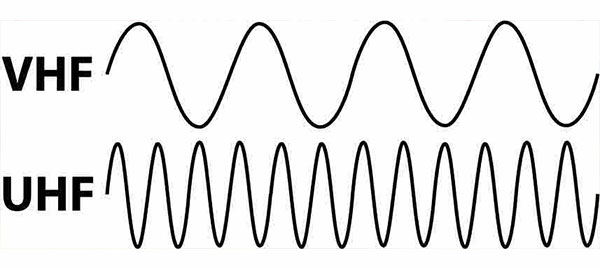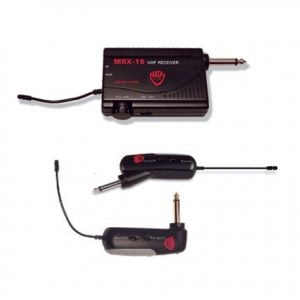- Home
- Instruments
- Gear
- Recording
- Lessons
- Reviews
- Blog

Wireless guitar systems are obviously the next step in getting the signal from the guitar to the amp. Due to their price, not a lot of people opt to use them, although big-name performers consider them a crucial part of their gear. If you'd like to know what some benefits of using guitar wireless systems are, check out our article here ‘What's The Benefit of Using Guitar Wireless Systems'.
One of the biggest questions people have about this technology is how exactly does it work. The principle behind getting your guitar's signal to the amp using wireless tech is pretty simple and is something we have been using in other areas of life for decades now.
This article is going to answer this question, and give you a bit more information about the nature of this technology. Just as any piece of tech out there, guitar wireless systems come in many different forms, and offer a whole range of different features. However, we won't go into that at the moment. Let's go ahead and take a closer look at guitar wireless systems, and discuss the way they work.
Wireless technology is without a doubt one discovery that had a lot of impact on the world as we know it today. What started as an advanced form of communication has become a tool we use to control a huge array of devices in all areas of life.
This tech has also found its way into music. Guitar wireless systems are based on the same basic principle as any other type of this tech. You have a transmitter and a receiver. The transmitter is hooked to your guitar. Its job is to turn the analog signal coming from your guitar into a digital signal that is later transmitted to the receiver using a certain radio frequency band. The receiver decodes the information and feeds it to the amp in an analog format.
Even though there's a bit more to this process, the principle we just described is the gist of it. When you talk about radio frequencies, things get a bit more complicated. Since a lot of devices use radio frequencies to communicate with each other, things tend to get a bit crowded.
Even though we don't see it, the air around us is full of all kinds of radio waves operating at different frequencies. Because of this, guitar wireless systems work in different frequency ranges. There are generally two bands used by this technology. We have Ultra High Frequency (UHF) and Very High Frequency (VHF), both using Frequency Modulation or FM.

Each of these has their pros and cons in terms of how they facilitate the signal being sent from your instrument to the receiver. UHF is currently the optimal choice since it suffers the least interference and is not as crowded, but that is slowly changing. VHF will make a lot of people in the know wince. However, it's slowly regaining popularity due to new bandwidth requirements.
What you need to keep in mind is that different frequency range brings different features. One is not inherently worse than the other, rather it all depends on the environment they are used in. One thing that is far more important than the frequency range is the flexibility of the frequencies used. If your wireless guitar system uses a fixed frequency, chances are you will experience a lot of noise and interference in some places.
You simply don't know what kind of equipment is nearby that uses that same frequency, which increases the level of uncertainty. Models that have a more or less locked frequency are cheaper, but their practical value is limited.
Having a guitar wireless system that is capable of frequency hopping, whether it's manual or automatic, is the best way to go. With this feature, you don't have to worry about running into problems we mentioned above as you can simply jump to the next free frequency that is available. In the earliest stages of this technology, the link between the transmitter and the receiver was extremely fragile.
 Thankfully, those days are long gone. Now we have guitar wireless systems that will automatically sing the receiver and the transmitter, and choose the least crowded frequency on their own. On top of that certain models will have more than one antenna which allows the device to choose which one is receiving the best quality signal, and use that antenna to communicate with the transmitter.
Thankfully, those days are long gone. Now we have guitar wireless systems that will automatically sing the receiver and the transmitter, and choose the least crowded frequency on their own. On top of that certain models will have more than one antenna which allows the device to choose which one is receiving the best quality signal, and use that antenna to communicate with the transmitter.
Even with all of these advancements, it's still recommended that you keep the receiver in the visual range of the transmitter. This greatly reduces the risk of signal loss or interference by hard objects. On most stages, this is absolutely not a problem to achieve. but it's still something to keep in mind when setting up the gear.
At this point, you are probably thinking that it takes too much effort to set everything up and that a cable is still a better choice. In reality, once you figure out how guitar wireless systems work, you will find it pretty easy to assemble and disassemble everything on a regular basis.
Compared to some other devices that utilize radio waves to communicate, guitar wireless systems are pretty simple. If set up correctly, they can be just as reliable as a cable. The benefits they bring to the table dwarf all the effort and costs involved in acquiring one of these systems and learning how to use it. Those who perform frequently, especially in larger venues or stages, will find wireless guitar systems to be a must-have piece of equipment.
After all, cables have their own limits as well. One thing to keep in mind is that certain states or countries require licenses for specific frequency bands. This is something you will have to find out before you go shopping for a guitar wireless system. You definitely don't want to invest in one only to find out that you are not allowed to use it because of the frequency it utilizes.
With all this stuff out of the way, feel free to proceed to our list of Best Guitar Wireless Systems on today's market.

Reader Interactions